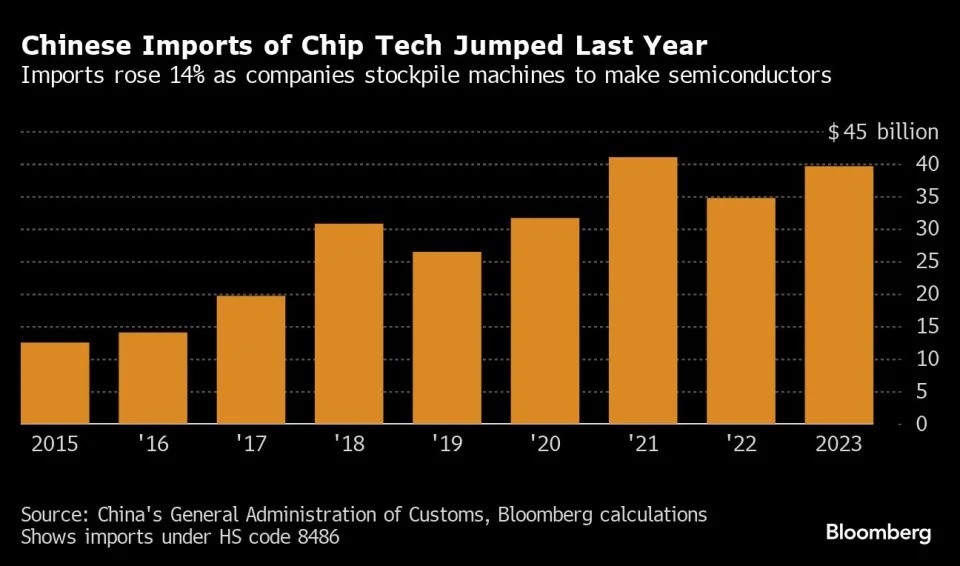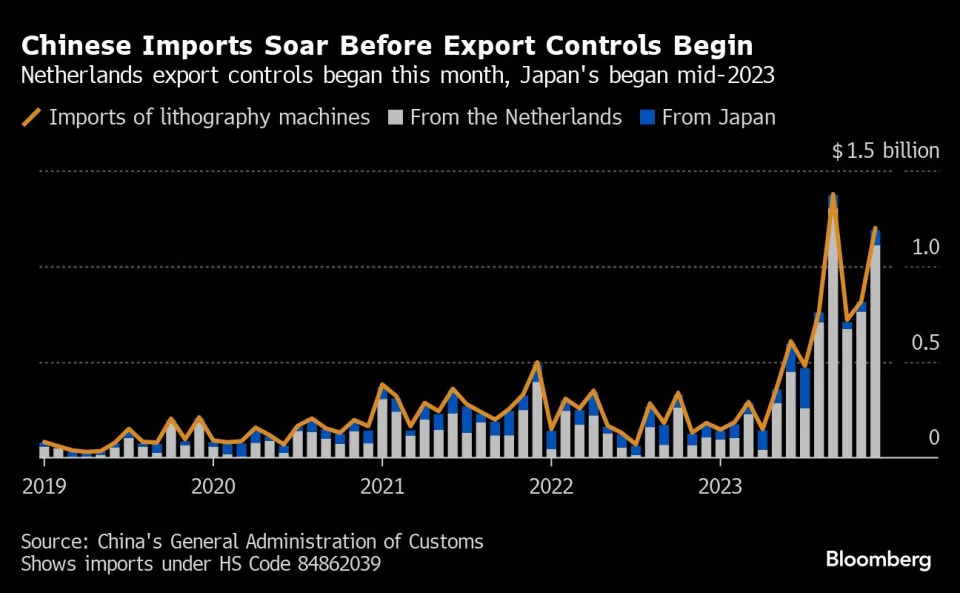China Buys Near-Record $40 Billion of Chip Gear to Beat US Curbs


(Bloomberg) -- China’s imports of chipmaking machines jumped last year as firms ramped up investment in an attempt to get around US-led efforts to hobble the nation’s semiconductor industry.
Imports of the machinery used to make computer chips rose 14% in 2023 to almost $40 billion — the second largest amount by value on record in data going back to 2015, according to Bloomberg calculations based on official customs data. The increase came despite a 5.5% drop in total imports last year, underscoring the importance that the Chinese government and the nation’s chip industry have placed on becoming self-sufficient.
Chinese chip companies are rapidly investing in new semiconductor factories to try and advance the nation’s capabilities and get around export controls imposed by the US and its allies. Those curbs are making it harder for Chinese companies to get access to the machines needed to make the most powerful chips — and slowing the development of China’s high-tech sector, which is seen as a threat to the US.
China’s imports from the Netherlands soared last year ahead of new export controls, which will further limit the ability of companies such as Semiconductor Manufacturing International Corp. to get the latest machinery.
In December, imports of lithography equipment from the Netherlands jumped almost 1,000% from a year earlier to $1.1 billion as firms rushed to buy ahead of the start of Dutch restrictions this month.
Even before those curbs came into effect, Dutch company ASML Holding NV had canceled shipments of some of its top-of-the-line machines to China at the request of the US government, Bloomberg reported earlier this month. The cancellations came weeks before export bans on the high-end chipmaking equipment came into effect.

 www.yahoo.com
www.yahoo.com


(Bloomberg) -- China’s imports of chipmaking machines jumped last year as firms ramped up investment in an attempt to get around US-led efforts to hobble the nation’s semiconductor industry.
Imports of the machinery used to make computer chips rose 14% in 2023 to almost $40 billion — the second largest amount by value on record in data going back to 2015, according to Bloomberg calculations based on official customs data. The increase came despite a 5.5% drop in total imports last year, underscoring the importance that the Chinese government and the nation’s chip industry have placed on becoming self-sufficient.
Chinese chip companies are rapidly investing in new semiconductor factories to try and advance the nation’s capabilities and get around export controls imposed by the US and its allies. Those curbs are making it harder for Chinese companies to get access to the machines needed to make the most powerful chips — and slowing the development of China’s high-tech sector, which is seen as a threat to the US.
China’s imports from the Netherlands soared last year ahead of new export controls, which will further limit the ability of companies such as Semiconductor Manufacturing International Corp. to get the latest machinery.
In December, imports of lithography equipment from the Netherlands jumped almost 1,000% from a year earlier to $1.1 billion as firms rushed to buy ahead of the start of Dutch restrictions this month.
Even before those curbs came into effect, Dutch company ASML Holding NV had canceled shipments of some of its top-of-the-line machines to China at the request of the US government, Bloomberg reported earlier this month. The cancellations came weeks before export bans on the high-end chipmaking equipment came into effect.

China Buys Near-Record $40 Billion of Chip Gear to Beat US Curbs
(Bloomberg) -- China’s imports of chipmaking machines jumped last year as firms ramped up investment in an attempt to get around US-led efforts to hobble the nation’s semiconductor industry. Most Read from BloombergTesla Sinks After Warning About ‘Notably Lower’ Growth RateUS GDP Grew 3.3% Last...

